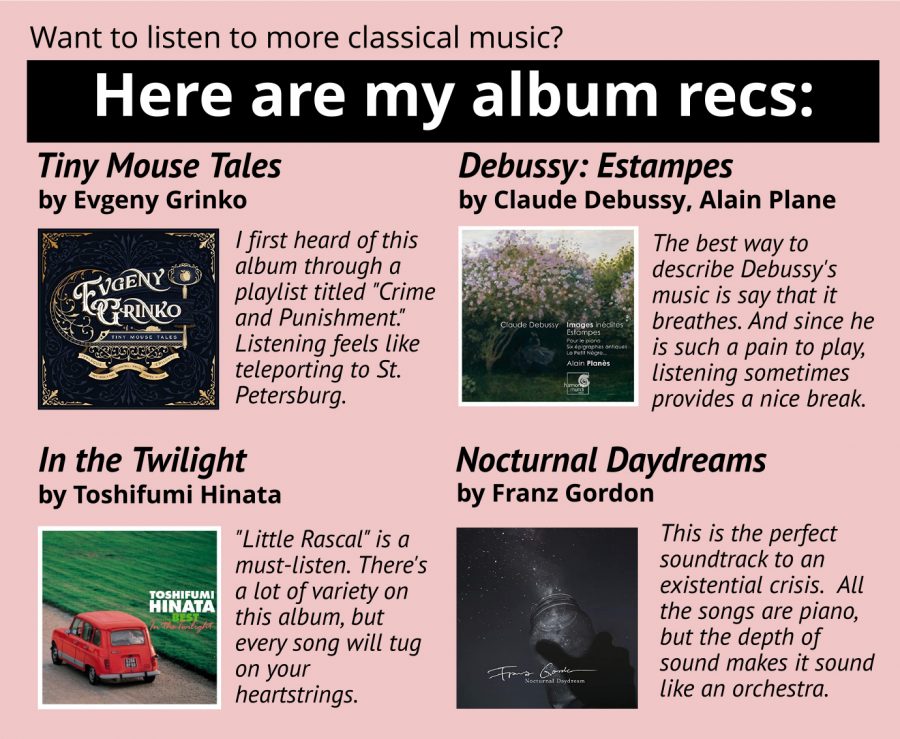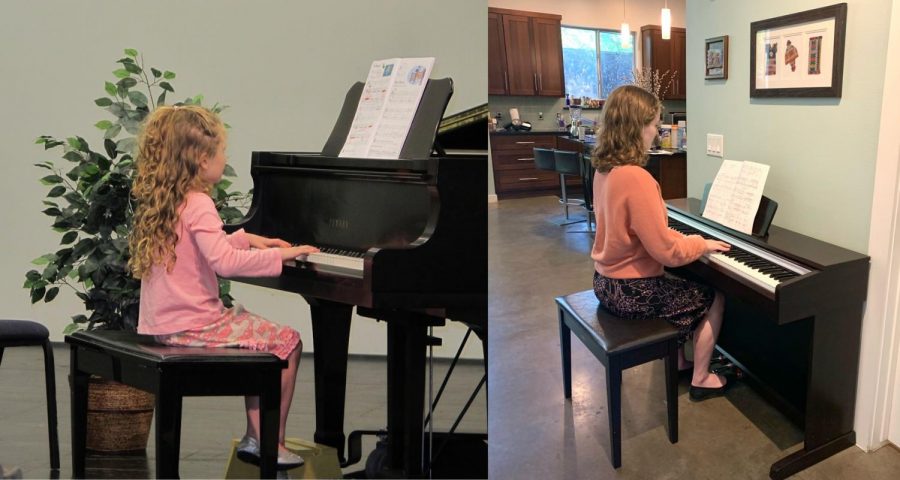Pandemic has me playing a different tune
This winter, I made the fated trip downstairs to reconcile with an old friend and foe: the piano I grew up on
The younger version of the author and the current version both play piano. The author and pianist would like to draw attention to her perfect technique in both images as well as her flexible wrists, her straight back and her eyes looking intently at the music. … With this picture, you could even mistake 6-year-old Alysa Spiro (or the 17-year-old version) for a piano prodigy.
May 30, 2021
I learned how to read music before I learned how to read words, which simultaneously sounds pretentious and obnoxious, but bear with me.
Growing up, I was an avid disciple of Music for Little Mozarts. With Beethoven Bear watching over me from one side, and Mozart Mouse from the other, I’d spend hours pounding at the keys sweating over getting “Twinkle Twinkle Little Star” right. After a while, my finger pads would begin to hurt because of the sheer strength with which I hit those keys, and I’d retire for the night.

Around the age of 5, I graduated from the program, no longer a “little” Mozart but a real one (or so I thought). Suddenly, there were two bar lines sprawled across the page and left and right hands that did different things and slur-lines that stretched for measures and pedals you were supposed to play with your feet (but not always, only sometimes).
The single-line notes started to multiply into double, triple and quadruple-line notes until eventually, the entire page looked like a terrifying gibberish of lines and curves and dots sprawled across the page. Gibberish to everyone except those who knew how to crack the code of music.
I prided myself on my ability to read music. It was this ability to see a line and a dot and automatically understand the secret behind it that made it so easy for me to get into classical singing. My Lamar choir audition was a breeze. Sight-reading was a breeze. Singing was a breeze. Music in general felt incredibly safe. To me, it looked like nothing more than words on a page. But I was a chronically bad practicer.
The hours I used to spend striking the piano keys slowly waned. As my touch on the keys became lighter, so did my passion for the beautiful black-and-white instrument that sat before me. The multi-colored marks I scribbled into my scores to remind myself of flats and sharps suddenly became the only thing colorful about my playing. Practicing became a chore. The stickers my wonderful piano teacher put on my piano books weren’t enough to motivate me.
And eventually, my chronically bad practicing became debilitating. I couldn’t move forward in my books. My eyes were on other sights—the shiny destination of choral singing and musical theatre. So I closed the lid of the piano. I let the dust collect. And I walked away. It’s been about four years since I closed the lid on the piano. Since then, I’ve sung in varsity choirs. I’ve been in ZACH’s Pre-Professional Company for years. I’ve performed in school musicals and regional theatre productions. Music hadn’t left my life, but the piano wasn’t part of the score. It had lost its resonance.
One night during quarantine, I was laying in bed watching a show about this young piano prodigy who stopped playing the piano because of the negative emotions he associated with the instrument. But man, did he love that thing. He’d sit at it, not playing, just staring at its keys and letting the music flow through his head. He loved music, loved its secrets. He’d imagine playing, but would stop short of actually setting his fingers on the keys.
I winced.
From early on, I realized I was not a prodigy.
My hands were too small to reach the octaves.
I couldn’t read the score nearly as fast as everyone else. I was embarrassed at my lessons when I couldn’t play my songs well because I hadn’t spent enough time practicing. And more than anything, I was embarrassed because I had quit.
Thinking about this, I winced again.
A few days later, I made the fated trip downstairs and stared at the black boxy machine sitting in our hallway. I pulled out the uncomfortable seat and sat down. I put my iPad on the music stand and pulled up the score I’d been eying for a few days: “Reflections” by Toshifumi Hinata.
So I sat and I played. I played through my Excalibur creative writing class. I played until my fingers felt like they did when I was my 5-year-old self, pounding away at the keys for hours, sacrificing technique for raw passion.
By the end of the day, the piece (or at least the way I played it) was still really bad. My left and my right hands didn’t match. I could barely even read the bass clef. There was no room for color in my playing because I could barely get through a measure without stopping, my mouth hung agape and my brow furrowed.
So I got up, pushed the piano seat back under the piano and went back upstairs. But unlike last time, the next day, I came back.
It’s been about one year since quarantine started and four months since the day I sat down at the piano for the first time in years.
Since then, I’ve learned five or six separate pieces, each one a piece of music that resonates deeply with me. I’ve spent hours seated at the piano, staring at scores, piecing together the dots and lines that aren’t exactly foreign, but no longer familiar. Furrowed brow and mouth agape, I once again bang at the keys a little too harshly, sacrificing technique for passion.
After a while, the songs don’t sound too bad. Life flows throughout the house as I play “Clair De Lune,” pouring all of my sorrow into those keys. Life flows through the house as I play “Merry Go Round of Life,” the excitement that I seek channeled into the keys.
The fact that I am not a prodigy, that I quit the instrument that created who I am today—it’s all lost in the resonance and the life that is breathed into my house. I sit at the piano, fingers throbbing over the octaves I can’t quite reach, as I place the entirety of my emotions into the hands of this strange, black instrument. Sometimes I get teary-eyed playing. I get overwhelmed by the things I feel while I play: the former disdain for this instrument, the hatred towards myself for quitting, the desire to play something beautiful.
It took a pandemic for me to rekindle my love with the piano. But I don’t really think I’d want it any other way.




